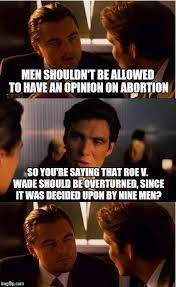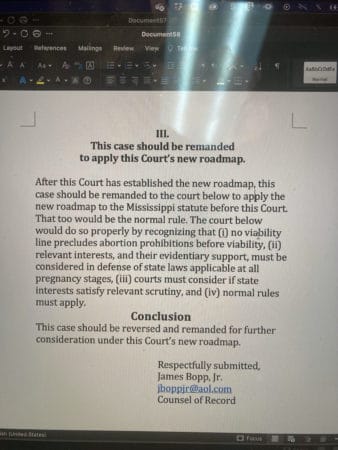Introduction

The left just had a collective hissy fit over the SCOTUS refusal (5/4) to strike down a Texas abortion law. That law had some unique and creative features, along with some good lessons for everyone on the pro-life side of things, incrementalists and abolitionists both. More about all that in a minute.
As I write this, there is a temporary injunction against the law, but seeing that SCOTUS has already declined to take it up, I think the emphasis should be on the word temporary. In addition, woke capital has also been doing some saber rattling—not wanting to do business in any state that protects the lives of the unborn. They will do business in all kinds of other places, like with the ChiComs and such, so they have apparently learned the trick of retaining moral purity while chumming around with ne’er-do-wells. Why don’t they just use those skills here? Probably because such skills don’t work in reverse. They don’t work when you are doing business with people who do unpopular righteous things. They only work when you want to make some tawdry money.
And of course Resident Biden has said that the law is “almost un-American,” which was withering criticism indeed, and he promised that his administration would swing into action to ensure that women can continue to kill their children in Texas. He didn’t put it that way, of course.
What the Texas Law Does
The Texas law is basically a heartbeat law with a twist. It bans abortions after six weeks (which is before many women even know they are pregnant), but the enforcement mechanism is where the twist comes. The enforcement mechanism is not the state. What the law does is allow anyone—including non-residents of Texas—to sue (for up to 10K) anyone who helps a women procure an abortion after six weeks. The mother herself cannot be sued, but the abortionist can be, along with Planned Parenthood clinic staff, the boyfriend who paid for it, and so on. In other words, the enforcement mechanism moves the issue from criminal court into civil court. And SCOTUS let the law stand.
Also on the SCOTUS docket for this fall is the Mississippi case (Dobbs), which presents a direct challenge to Roe. In our worship services, we have been praying that the Court would overturn Roe directly by means of this case, but even it they don’t, we may already have a crack in the dam. If this Texas law withstands the barrage currently being leveled against it, there are now opportunities for a significant erosion of Roe.
And that word erosion brings up the issue of incrementalism and abolitionism again.
To Review
In the past, I have written on the debate between pro-life incrementalists and pro-life abolitionists. I have argued that the abolitionists have a point when they say that it is never appropriate to pass a law that helps its sponsors to say something like, “and after that, you can kill the baby.” And the incrementalists have a point when they say that all our efforts are of necessity incremental—heartbeat laws are incremental, but no more incremental than starting your efforts in Oklahoma would be. The key is to accept the incremental nature of the battle while never forgetting the ultimate goal of genuine pro-life activism, which is the entire eradication of every form of human abortion. I call that smashmouth incrementalism. If you need some more background on all that, you can find it here, here, and here. And if you want more, just type smashmouth in the search bar.
The Spiritual Lesson
Jesus once used a striking illustration to teach us the value of importunity in prayer, but we can also learn a lesson about persistence generally in our pro-life activism.
“And he spake a parable unto them to this end, that men ought always to pray, and not to faint; Saying, There was in a city a judge, which feared not God, neither regarded man: And there was a widow in that city; and she came unto him, saying, Avenge me of mine adversary. And he would not for a while: but afterward he said within himself, Though I fear not God, nor regard man; Yet because this widow troubleth me, I will avenge her, lest by her continual coming she weary me. And the Lord said, Hear what the unjust judge saith. And shall not God avenge his own elect, which cry day and night unto him, though he bear long with them? I tell you that he will avenge them speedily. Nevertheless when the Son of man cometh, shall he find faith on the earth?”
Luke 18:1–8 (KJV)
Here we have a judge who does not fear God, and who does not regard man. He plainly graduated from one of our Ivy League law schools, which meant that he was above it all. He did not care what happened to the hoi polloi, but he did care about what happened to him, and this widow woman was being a pain in the neck. Jesus was using this as an a fortiori argument—if persistence can bend a calloused judge to do the right thing, then how much more will the persistence of God’s elect be persuasive to their Father?
But we need not limit ourselves to that ultimate lesson. We may also take this as a license for pestering judges who do not fear God or regard man. That is what has been happening with the steady stream of various kinds of variegated pro-life cases that wend their way up to the Supreme Court.
Policing Our Own
The debate between abolitionists and incrementalists can get pretty heated, and I would like to appeal to the cooler heads in both factions. Some abolitionists would rather fight consistent pro-lifers than to fight abortion, and this is just ungodly. And some incrementalists have forgotten the point of the increments, which is just as ungodly, and an illustration of where the abolitionists have a valid point. The best thing would be if the cooler heads in both factions repudiated the compromises that are occurring in their own camp. If such were to happen, the world would be a better place.
The debate generally comes down to whether an abolitionist governor could sign an incrementalist bill, say a heartbeat bill. The abolitionist would say that he could not sign a bill that did not protect all the children. In doing this, he fails to protect the children that the bill protects. But the incrementalist politician who would sign such a bill could fail in the opposite direction. If he says (in his heart), “There, I signed it. Maybe now these pro-lifer crazies will leave me alone,” then he is failing in his duty to protect the children still awaiting protection, the ones that the heartbeat bill does not yet cover.
I would sign such a bill, and include alongside it a signing statement that we will not rest until we protect all the children. That is what I am calling smashmouth incrementalism. If you give us what we are demanding now, we will most certainly be back in the next legislative session, demanding more.

Nevertheless, in the spirit of what I said just above, it has to be acknowledged that certain abolitionist critiques of the pro-life establishment are plainly on the nose. For a particularly lurid example, as an organization, National Right to Life has clearly lost its way, its mission, and perhaps it soul. They actually filed an amicus brief before SCOTUS on the Dobbs case that was simply atrocious. If you are a donor to National Right to Life, it is high time to stop sending your money there. There are plenty of consistent pro-life organization. It is high time to look elsewhere—here is one that Nancy and support.
It is hard to argue with abolitionists when this sort of thing happens. And I don’t have any interest in arguing with the abolitionists about it, because whatever smashmouth incrementalism is, this is not it. It is bad for the soul to try to defend the indefensible.
But at the same time, an abolitionist governor who refuses to sign a heartbeat bill is not protecting the children with a heartbeat. And the incrementalist governor who “settles” for a heartbeat bill is failing to protect the children who do not yet have a heartbeat. But I do not bring this up to get that debate blazing again.
The issue is not whether abolitionists could sign an incrementalist bill. The issues that are barrelling toward us are, in my view, quite different.
Building on Incrementalist Victories
What shall we do if there are cracks in the dam? What can we do if the dam breaks? I hope the answer will not be “continue to fight with one another.”
It is starting to look as though the next real question is whether abolitionists can be willing to capitalize on incrementalist victories. I don’t agree with an abolitionist’s scruples about signing a heartbeat bill, but I do understand those scruples. I see and get the argument. But I don’t see any consistent argument that would prevent a Texas abolitionist from suing a Planned Parenthood doctor in his city.
If he were to say that the approach is deficient because he can’t sue them all, this conflicts with his earlier willingness to introduce an abolitionist bill in just one state legislature—instead of introducing 50 such bills in all of them, or one omnibus bill in Congress. In other words, suing one doctor is simply geographical incrementalism, which the abolitionists were already committed to.
Or, to illustrate further, suppose the Mississippi incrementalist law is upheld by SCOTUS and as a consequence Roe is overturned. I am not predicting this (although I am praying for it), but run the thought experiment out. If incrementalists succeed in overturning Roe, individual states can still allow abortions, just as some states had done prior to Roe. Under such a circumstance, with Roe overturned, the incrementalists did something that paved the way for abolitionists to do something at the state level.
The Pro-Life Bottom Line
Where do we agree? If we agree that our ultimate goal is the ultimate eradication of all human abortion, I don’t see why we can’t shake hands and return to our respective stations, prepared to work toward that end. We all have to decide before God where we will stand, and what we are going to do about it. If we are laboring with that ultimate goal in mind, I would suggest that the best thing we could possibly do is leave one another alone, and to offer our own labors up to God.
“Who art thou that judgest another man’s servant? to his own master he standeth or falleth. Yea, he shall be holden up: for God is able to make him stand.”
Romans 14:4 (KJV)

